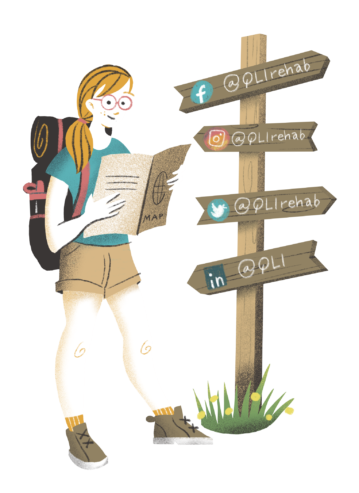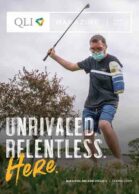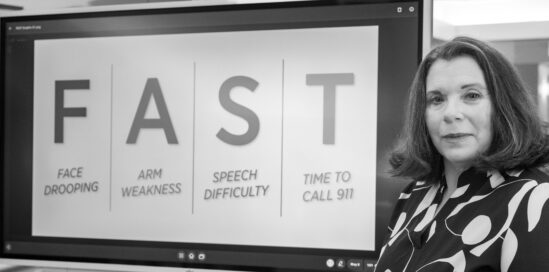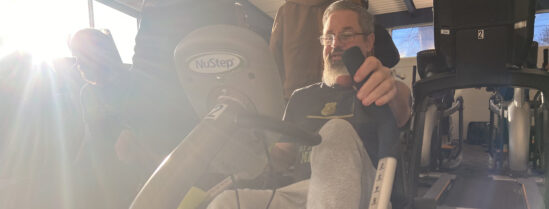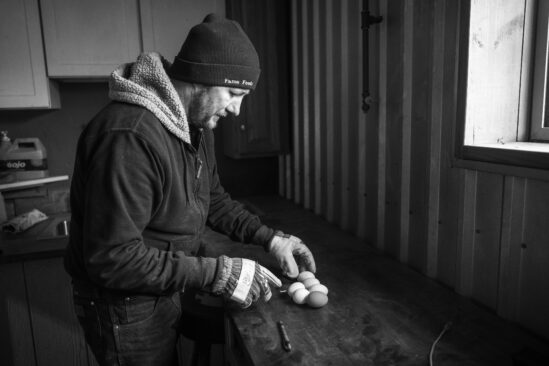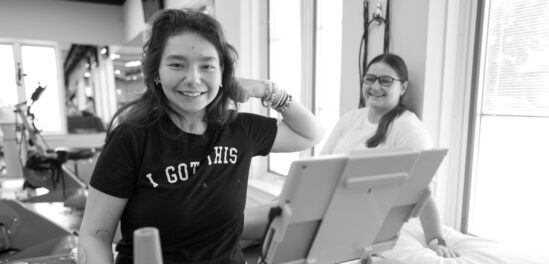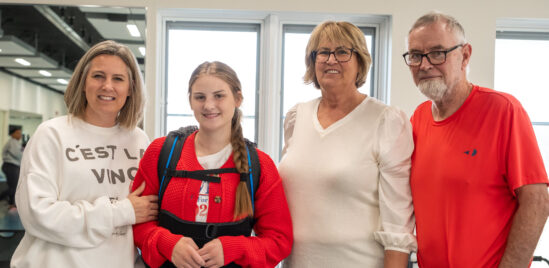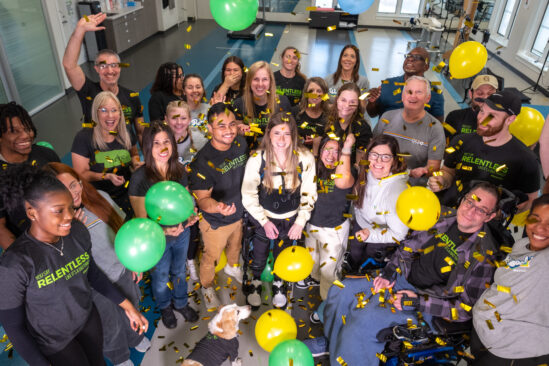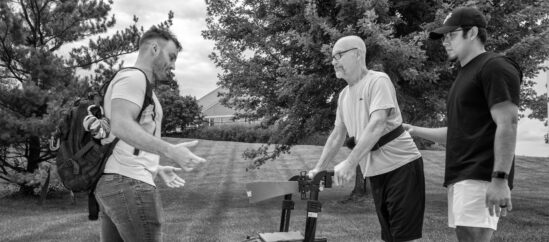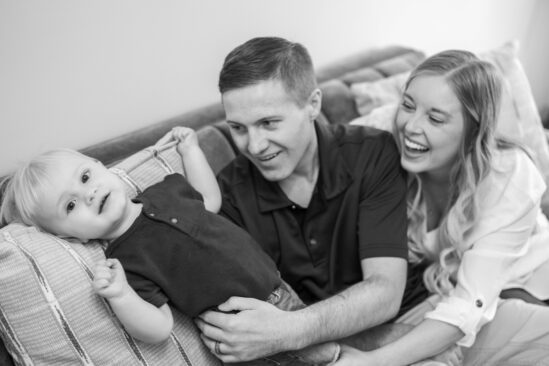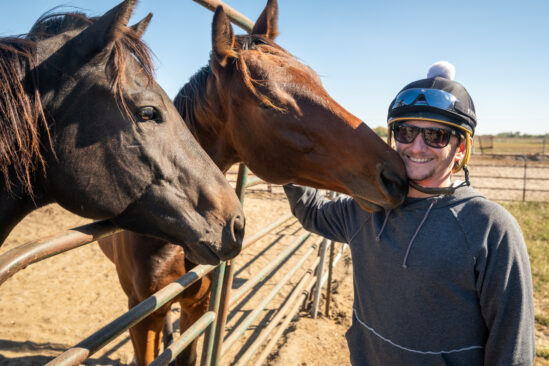*Client names have been altered to protect identity*
“‘They brush their…’” an expectant pause follows this unfinished sentence. On the screen, a few options are up for selection to complete it.
“Hands | Eyes | Nose | Teeth.”
The client—Amy—looks at the iPad with intent. After a few quiet moments, she makes her selection: ‘Teeth.’ She says this word softly, confidently. The screen makes a ding—the correct choice.
“Nice job,” says Lydia, and she taps the arrow to move on to the next sentence.
Amy’s current speech pathology sessions consist of matching items, word association exercises, and sentence completion. There are still the occasional distractions for her, like looking up from the activities to say an emphatic and elongated “hello!” to a passerby in the Lied Life Center, or gazing at 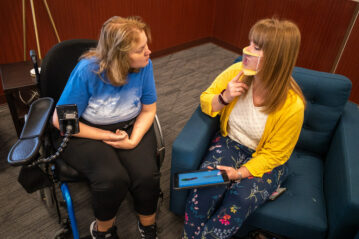 individuals coming and going through the automatic sliding doors. Over the past couple of months, slow and steady progress meant that Amy’s aphasia, a condition that affects an individual’s ability to understand or express language, was diminishing slightly in its effect. The deficit would remain in some capacity for the rest of her life, but there was still progress to be made.
individuals coming and going through the automatic sliding doors. Over the past couple of months, slow and steady progress meant that Amy’s aphasia, a condition that affects an individual’s ability to understand or express language, was diminishing slightly in its effect. The deficit would remain in some capacity for the rest of her life, but there was still progress to be made.
Improvement over the last few weeks is very positive, and Lydia notes that Amy is getting better at repeating words and phrases. At Lydia’s guidance in a slow and measured tone, Amy says “good…morning” when meeting someone in the session’s area, followed with another slow and measured “how…are…you?” Repetition breeds familiarity with routine phrases, and as a result of the progress of these daily sessions, Lydia beams with pride at Amy’s many accomplishments.
“I even shared my story with you, right?” Lydia asks her.
Looking up, Amy says a quiet “thank you,” another one of her frequent phrases and responses to many questions if someone interacts with her. This time, however, “thank you” is not a rote response. The emotion in Amy’s face says more than those two words convey together. It is a genuine feeling and bond that Lydia shares with all of the clients she works with.
There is no false pretense for anything in her work, and everything is gone after with total dedication. Lydia Schieuer understands the experience from both sides. Six years prior, she was not a Speech and Life Skills Assistant, but a QLI client herself.
“We saw Lydia get her life back”
“Please hold Lydia in unrelenting prayer, that she will fully recover soon…”
A Sunday afternoon like any other changed in a matter of minutes. Her mother had stepped out of the room, and then it happened. A sudden headache and vomiting—immense pain that needed emergency medical attention. That afternoon—just a few weeks before her junior year of college was set to begin—was a fork in the road. In the transfer from Methodist Hospital to Nebraska Medicine—where doctors performed an emergency craniotomy on Lydia—her life plan that seemed so sure suddenly shifted, threatening to become undone.
“I remember waking up and not being able to fully understand what people were saying. I tried to speak, but wasn’t able to express what I wanted to say.”
Lydia suffered a massive hemorrhagic stroke, and her path into the future hung in a still and foreign air that was unknown to the family. Doubt and uncertainty loomed over every procedure and every coming day. Yet just as equal to the storm of the unknown was the steady faith and determination of the family. The concern of Rick and Jewel Schieuer, to see their daughter just a few weeks before her junior year of college suffer a brain injury, was secondary to the hope they held for the future.
A cerebral arteriovenous malformation (AVM) is extremely rare, occurring in less than 1% of the population. Formed at birth, it can strike at any time. Being held at the whim of time— as prevention was not an option for Lydia—it became a matter of weathering the inevitable storm and coming out strong on the other side. In these moments for her family, the faith and trust in those who cared for her provided a sense of calm and perseverance—something entirely necessary for the family to move through the low moments together.
A community formed around a Caring Bridge site created by her parents. The updates in the days just after Lydia’s stroke were ever changing in tone but never wavering in the concern that underlined the experience.
“Prepping for angiogram…”
“The angiogram revealed no abnormalities of immediate threat…”
“Her speech is clear! | She struggles to find some words, but she knows what she wants to say! | There is no paralysis!”
The path that Lydia had formed and walked prior to her rare brain injury was one like many of her peers. “Her goals pre-stroke were to graduate from college, start a meaningful career, and live on her own. Those goals did not change significantly, although the path certainly did.” Lydia’s father Rick notes this with conviction. Even after a life-altering event, the desired trajectory still remained the same, and the positive nature of her character was amplified.
Her parents made the trip to her school to cancel Lydia’s housing and withdraw her from classes. However, this was not a permanent setback in Lydia’s path forward, but a speedbump—where that unknown of before was turned into an actionable plan through therapy and rehabilitation at QLI. “The clinicians weren’t saying ‘if’ she returned to college,” said Rick. “They were focused on when she would return.”
During her time as a client at QLI, the hope and determination of her parents was affirmed. “Inevitably,” writes Rick, “Lydia would notice other clients who needed help with this or that, and step in to gently
“In the midst of brain trauma, some people have dramatic, unwelcome personality changes,” wrote Jewel in a Caring Bridge entry. “I am heartened to see that Lydia remains kind and sensitive towards other people.” Even when so much was taken away from her, the true core of Lydia’s character remained.
“Seeing videos of Lydia in the hospital not being to talk, count, or even write letters, and then witnessing her gradually progress to get words out and communicate her wants and needs was inspiring. We saw her confidence and personality return,” says QLI Director of Clinical Services Taylor Kerschke.
“We saw Lydia get her life back.”
So Much More Than Recovery
With five months of time spent away from school at the University of Nebraska Lincoln, Lydia was not only excited to meet and tackle this challenge, but was warmed by the opportunity to return in some respects to the path that was her normality pre-injury. This spring class represented one step forward on the new path—a starting point and stone that would be a new foundation over time.
Lydia’s mother Jewel defines this transition as “the same road, but different destination.” In a Caring Bridge post in the middle of the spring 2016 semester, Jewel wrote:
Seven months and one day ago, Lydia absolutely could not have begun to comprehend a test like the one she took today. She couldn’t read, couldn’t feed herself, and couldn’t string together an effective sentence. Lots of “couldn’ts” arise when blood spills freely into places in your brain where it should never be.
When looking to create a new commercial in May 2016, QLI chose Lydia to be its subject. Filmed at a rock wall gym in Omaha, Lydia’s journey would be described in a voice over. “We were going to have someone else do the narration for the commercial,” says QLI Director of Creativity Jon Pearson. “We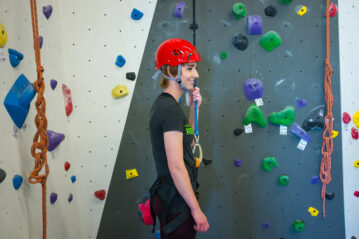 gave one line to Lydia and were blown away by the power she conveyed in her voice. We knew right there that she had to do the rest.” Renewed agency rose. The commercial Lydia participated in proved the first culmination of her journey upwards. This benchmark would serve as a flashpoint in her recovery—a reminder of a triumph in a short span of time.
gave one line to Lydia and were blown away by the power she conveyed in her voice. We knew right there that she had to do the rest.” Renewed agency rose. The commercial Lydia participated in proved the first culmination of her journey upwards. This benchmark would serve as a flashpoint in her recovery—a reminder of a triumph in a short span of time.
The Return to School
In the fall 2016 semester, Lydia returned to the University of Nebraska Lincoln for a full credit schedule. Even through a difficulty in processing information and completing homework, Lydia persevered. Presenting lesson plans and tackling mid-term and final exams were met with a vigorous dedication. The setback of the previous year was not one that halted the path forward for Lydia, but rather reaffirmed the strength of her character and drive to meet challenges.
During this year back at college, Lydia made the decision to change her major, focusing on Human Development and Family Sciences. This change was one made to combine both a passion towards working with children in a more manageable way following her injury. In addition, Lydia took a rock climbing course. This comprised a single elective credit—filler on the schedule in the eyes of many. But, for Lydia, it was a lens of freedom and a marker of personal growth. To tackle the wall and scale it a bit at a time was clear parallel to her recovery at QLI, ultimately represented in the QLI video.
From the bottom, the expanse of a cliff is no doubt daunting, signaling a great deal of work ahead. But from this place, it only takes one foothold and grasp of a rock at a time, slowly moving up the cliff face before scaling it—suspended at the top with a feeling of assured accomplishment.
In December 2018, something happened that a few years earlier would have seemed an insurmountable distance away—Lydia graduated from college. Upon leaving Lincoln, this accomplishment spoke to the resilience of an unknown future. The path Lydia forged prior to her injury never crumbled—it lay in wait for her return. From her experiences post-injury, that path was laid with a new foundation stronger than the one before, signaling to all that she would see her goals through to the end.
A Team Member at QLI
Lydia continues to triumph over the ongoing effects of the brain bleed. “I still face difficulties with expressive aphasia,” says Lydia. “Let’s say we’re having a deep conversation and someone later on asks me to describe that conversation. I wouldn’t be able to describe it in depth—it’s very difficult for me to remember all the little details.” She laughs. “I probably couldn’t give a TED Talk.”
The path now before her has taken on a cyclical shape. The core elements of helping and guiding others remained, but the nature of the help has altered following her post-injury journey. In May 2021, Lydia applied for a position at QLI. Knowing of the impact Lydia made on clients, team members worked to create a new position for her, allowing for her experiences to inform the work she would do as a Speech and Life Skills Assistant. Back at QLI to aid those finding their own new paths and journeys, Lydia is home.
In therapy sessions, Lydia tailors the material to best suit the particular client. If a client does not have aphasia or apraxia, Lydia works to help with their interests. Lydia is flexible in these moments. One morning, she meets Angela—a client—at the Lied Life Center. If Angela wants to work on applying makeup, for example, Lydia with her back to the house, so they can work on her beauty routine. During this time they chat on interests they have in common, and go through some crossword puzzles, testing both of their skills to the max.
Lydia represents growth and a living example of success and return to an actionable path. Through the hurdles during and after her initial recovery, she can relate to where the clients are now—she knows in 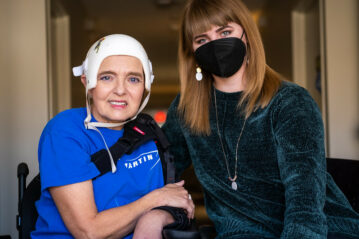 each therapy session the potential for their own growth and personal improvement. With her work at QLI, Lydia walks beside them on their personal recovery paths—a navigator through the speedbumps. It is in these times that hope is given to the clients to carry with them beyond their initial recovery.
each therapy session the potential for their own growth and personal improvement. With her work at QLI, Lydia walks beside them on their personal recovery paths—a navigator through the speedbumps. It is in these times that hope is given to the clients to carry with them beyond their initial recovery.
Whenever the two of them are together, Angela always takes a moment to tell those around about her work with Lydia. “She’s been a hero to me,” she’ll say, nodding her head with a fierce and intent gaze. “She’s an inspiration.”
“With the clients she works with, she deeply connects, cares, and genuinely wants to get to know the individual at a deeper level,” says Kerschke. “Through this, she knows what they value and what’s meaningful to them—this builds trust and allows them to open up to her. Lydia has come in early many days to work on Angela’s makeup, allowing her to feel ready and confident for the day. The residential team has noted how much this brightened Angela. Another big impact made by Lydia is bringing in her dog Ruby for therapy with clients.”
…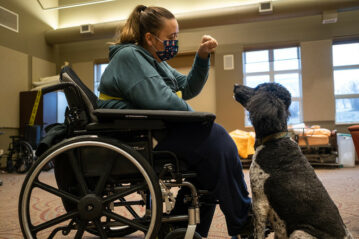
Around 2:30pm, the Lied Life Center bustles with energy. Speech pathologists work with clients to string sentences together, and occupational therapists work on life skills with clients. Some practice making a drink of choice in the Hub Café, and others make a meal in the nearby Mona Faith Kitchen. A friendly presence in this bustling area or helping to serve lunch in one of the six houses on Rehabilitation Campus, Lydia continues her personal mission of helping others that has remained above all a constant.
“QLI’s unrelenting and positive support of its clients, their families, and its entire team is unparalleled,” says Lydia. “I’m incredibly grateful for all that QLI–and my support system–has done and continues to do for me. Alone, my life’s journey post-stroke could not have reached its current point. I’m certain that returning to QLI as a team member was truly meant to be.
“I still struggle from my brain injury; learning, remembering, and finding the words I want to say is still challenging. Regardless, this life-altering event has given me the opportunity to reach out to others who are also struggling. My hope is to show these individuals that they aren’t alone and life is not over, it’s just turned in a different direction.”
This essence of her character can take many forms on the path and cliffs to traverse. When at the bottom of a rocky cliff-face, Lydia’s helping character is a rope to scale the face and reach the top. On the walking path, if she finds herself at a crossroads, her character is a lamppost keeping the right trail lit, so she never has to walk in the darkness. She traverses all that lies ahead—meeting what waits on the horizon.


